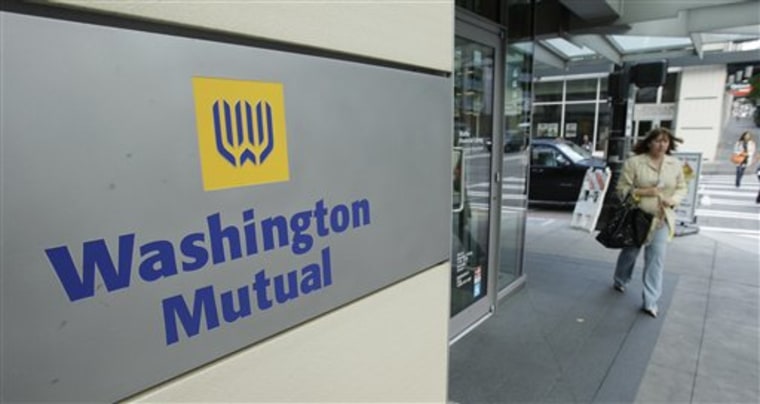Washington Mutual is known for its no-thrills, no-fees, unconventional banking with a hip, neighborly feel. Its nickname? WaMu. Its tag line? Whoo hoo!
But the recently collapsed bank's new owner, JPMorgan Chase, is known for being big and conservative — two very different vibes. Its advertising preaches value and security.
The newly combined company has its work cut out for it, experts say, if it wants to blend the two different brands and keep its customers.
It's not clear yet what will happen with the brands, but WaMu's ads will no doubt have to change to temper its feisty image, which has mocked staid rivals like Chase, said Jean-Pierre Dube, a marketing professor at the University of Chicago Graduate School of Business.
"It strikes me as incompatible because JPMorgan Chase represents precisely what Washington Mutual was critiquing and attacking in their advertising," he said Friday.
Washington Mutual Inc. was seized on Thursday by the Federal Deposit Insurance Corp., which then sold the thrift's banking assets to JPMorgan Chase & Co. for $1.9 billion. The collapse marked the nation's biggest bank failure. The sale makes JPMorgan Chase the second-largest bank in the U.S., after Bank of America Corp., which recently bought Merrill Lynch.
JPMorgan Chase said the acquisition will give it 5,400 branches in 23 states, and that it plans to close less than 10 percent of the two companies' branches. But little has been said about the brand marketing.
Neither company immediately returned calls and messages left seeking comment Friday.
The problems at WaMu had apparently been building for some time as the company got caught up in the subprime mortgage business, whose troubles spread across the entire industry.
But those issues weren't evident in WaMu's peppy ads, which portrayed a lively, unconventional banking environment.
Some of the ads positioned WaMu as a happier, freer alternative to its competitors. The "anti-stodgy banker" campaign launched in 2006 featured older men in suits who didn't like WaMu's perks such as free checking for life and free ATM cash withdrawals.
New ads feature the slogan "Whoo hoo!" and show people fantasizing about driving cars and being in kangaroo pouches, with their newfound financial freedom.
"The focal point is the customer's 'Whoo hoo! moment'" a statement announcing the campaign in February said. It defined the moment as "a dream-like state where customers visualize moments of personal elation in response to learning about WaMu products and services."
In an era that is seeing so much financial upheaval, JPMorgan Chase may want to drop those types of ads, Dube said. Tried and true may be a better route, he said.
"Washington Mutual had a radical message in their advertising and given how hard they fell it seems like maybe there's something to be said for the old, conservative, traditional banking model," he said. "The stodgy old businessmen may not be fun and give you deals, but they give you value. They give you security."
Value is also a big part of the WaMu package, said Rita Rodriguez, chief executive for the U.S. division of The Brand Union, a firm that helps companies create brand identities. She said the company was an early trendsetter of positioning itself as a friendly bank that was accessible and focused on helping customers.
The ads and free offers helped draw in customers like Jeremy Boyance, who lives in WaMu's hometown of Seattle. The 34-year-old who works for the U.S. Navy said he signed up with the bank a decade ago, drawn to its offer of free checking and its image of growth.
"It had an upward, mobile feeling about it," he said in a Seattle bank on Friday.
He described his investments there as substantial and said he planned to keep banking with WaMu.
Rodriguez said JPMorgan Chase may not want to completely abandon WaMu's marketing because of its personal approach.
"The challenge they will have from a brand perspective, is whatever happened with WaMu there will be people that still have strong associations to the brand and the challenge will be, what does and how does JPMorgan Chase integrate WaMu from a brand level?" she said.
Beyond marketing, like in any merger or buyout, there's an internal problem of joining the companies' two cultures and having that reflected in the employees, who are interacting with customers. She didn't want to make guesses on how that would play out.
There could be some wiggle room for the combined company, she said, because Chase doesn't really have a strong, distinguishable brand now other than being big and convenient, due to its heavy presence in key markets like the East Coast.
Chase has stepped up its marketing in recent years, Dube said, citing its ads that evoked a James Bond-esque thriller. That was considered pretty radical for the industry, but nothing like what WaMu has become known for, he said.
So maybe the problem really lies in how Chase will position itself, Rodriguez said.
"I think they have a challenge of saying who are they now through all of this, besides the rescuer or the bigger, getting bigger," she said.
